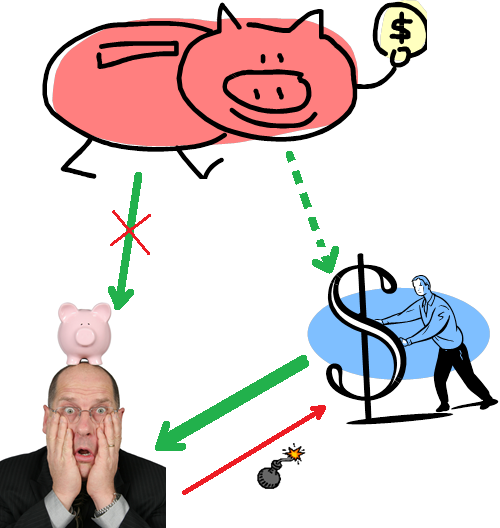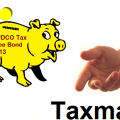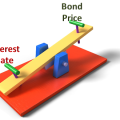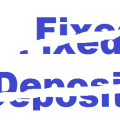Credit Default Swap (CDS) is an instrument with which a buyer of a bond transfers the risk of default on the principle amount of the bond from buyer of the bond to another entity for a premium paid over a period of time. If bond issuer defaults then this third entity can pay
- the principle amount of the bond in exchange for bond certificate, aka Physical Settlement or
- the difference between the face value and market price of the bond aka Cash Settlement
To further explain the concept, I consider
- Alpha – Person/company that bought bonds of company Beta. He/She/It is also CDS Buyer.
- Beta – Company that sold bonds to person/company Alpha
- Gamma – CDS Seller
- Person/company ‘Alpha’ buys bonds of company ‘Beta’ for a sum of $ 1 million dollars for a coupon rate of 6% per annum for 15 years.
- If ‘Alpha’ believes that ‘Beta’ may default in repaying then he will made a contract with company ‘Gamma’ that if ‘Beta’ defaults then ‘Gamma’ will pay principle. ‘Gamma’ will charge 0.05% per quarter for the duration of bond for undertaking such assurance.
Risk Hedging Instrument
If Alpha retains bonds for 15 years and Beta DOES NOT default then
Alpha
- Will get from Beta = $1 million + ($1 million * 6% * 15) = $1,900,000
- Will pay to Gamma = $1 million * 0.05% * 4 * 15 = $30,000
- Will earn in total = $1,900,000 – $30,000 = $1,870,000
- Profit% with swap = ($1,870,000-$1 million)/$1 million*100%=87%
- Profit% without swap = ($1,900,000 – $1 million)/$1 million * 100% = 90%
If Alpha retains bonds for 15 years and Beta defaults in 5 years then
Alpha
- Will get from Beta = $0
- Will get from Gamma = $1 million
- Will pay to Gamma = $1 million * 0.05% * 4 * 5 = $10,000
- Will earn in total = $990,000
- Loss% with swap = 1%
- Loss% without swap = 100%

If Alpha sells the bonds in secondary market prior to 15 years
Alpha
- Can profit the gain or get his capital back as per the market value
- Will need to contact Gamma to terminate CDS contract
Money Making Instrument
The premium for CDS for a bond may increase or decrease in financial market depending upon the likelihood of default of payment by the bond issuer. If likelihood of default increases then CDS spread increases i.e. more people/firms opt to take CDS cover and thus the premium rises. On the hand, if likelihood of default decreases then CDS spread decreases i.e. less people/firms opt to take CDS cover and thus the premium falls. Let us consider these two options with the example given above.
If likelihood of default by Beta increases
 Let’s assume that CDS spread is 0.1% per quarter after 5 years instead of 0.05%. Alpha will issue a CDS for the same bond to another investor Sigma for 0.1% per quarter for remaining 10 years.
Let’s assume that CDS spread is 0.1% per quarter after 5 years instead of 0.05%. Alpha will issue a CDS for the same bond to another investor Sigma for 0.1% per quarter for remaining 10 years.
Alpha
- Will get from sale of CDS = $1 million * 0.1% * 4 * 10 = $40,000
- Will pay for CDS to Gamma = $30,000
- Will gain from sale/purchase of CDS = $10,000
If likelihood of default by Beta decreases
Let’s assume that CDS spread is 0.025% per quarter after 5 years instead of 0.05%. Alpha will issue a CDS for the same bond to another investor Sigma for 0.025% per quarter for remaining 10 years.
Alpha
- Will get from sale of CDS = $1 million * 0.025% * 4 * 10 = $10,000
- Will pay for CDS to Gamma = $30,000
- Will lose from sale/purchase of CDS = $20,000
- Will still save $10,000 from CDS cost instead of not selling CDS
As you can notice, Alpha gains more if likelihood of default by Beta increases and gains less otherwise, so it seems CDS promotes risky behavior or rather default of companies. However, note that Alpha has risked his $1 million by selling CDS. Moreover, there is still a loss of bonus that company would have paid if it had not defaulted, so the gain is most when Beta does not default.
Criticism of CDS
- Transfer of risk from the original buyer of bond to another entity leads to dilution of perception of risk. In our example, when Alpha sold his risk to Gamma, Alpha will not be much bothered with functioning of Beta. If Gamma packages his risks and sells another financial product on this risk then the risk perception will further dilute.
- Naked CDS (Buying CDS without even holding a bond) leads to speculation on the health of a company. These instruments can grow multiple folds from even the total worth of bond-issuer-company. If such company fails then the impact is huge because all stakeholders will not be paid.
- CDS is not traded on an exchange and contracts are made privately. Lack of transparency leads to more chance of fraud and error.
Conclusion
CDS is a good instrument for hedging risk and it should be considered such only. Money making attempts from CDS is less of a reality so the companies engaging in buying and selling of CDS for such purpose should consider risks of original bond/company. Nonetheless, CDS still needs more transparency and regulation.



